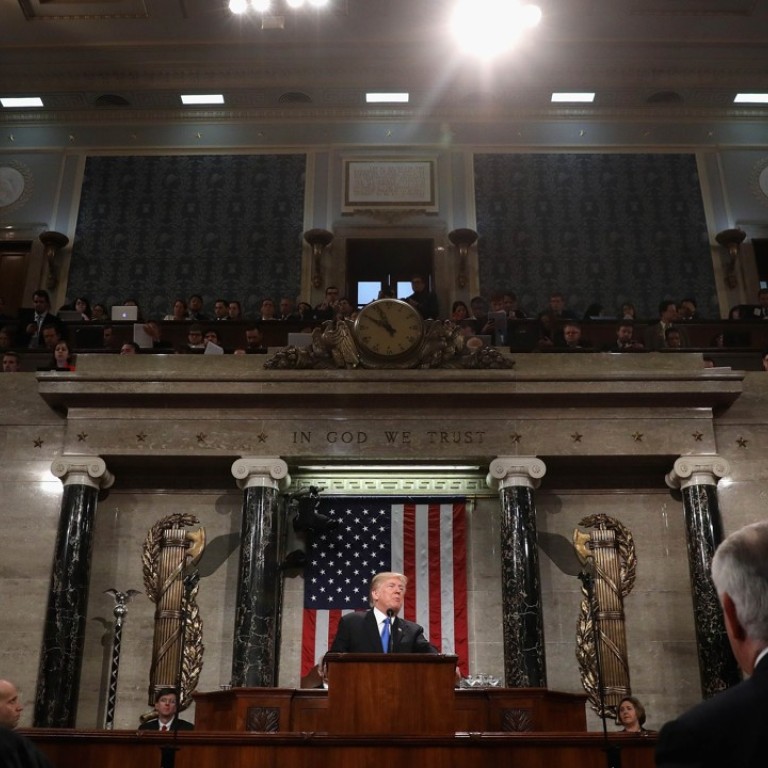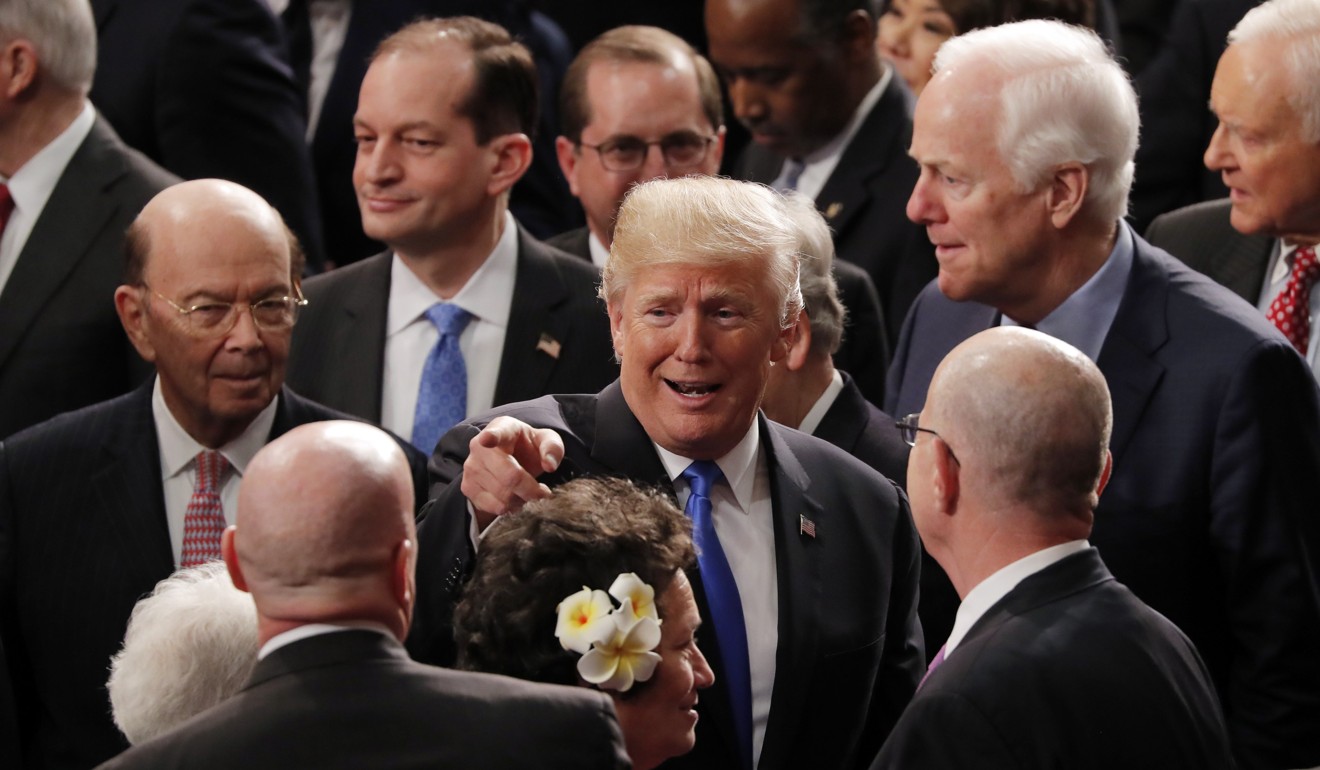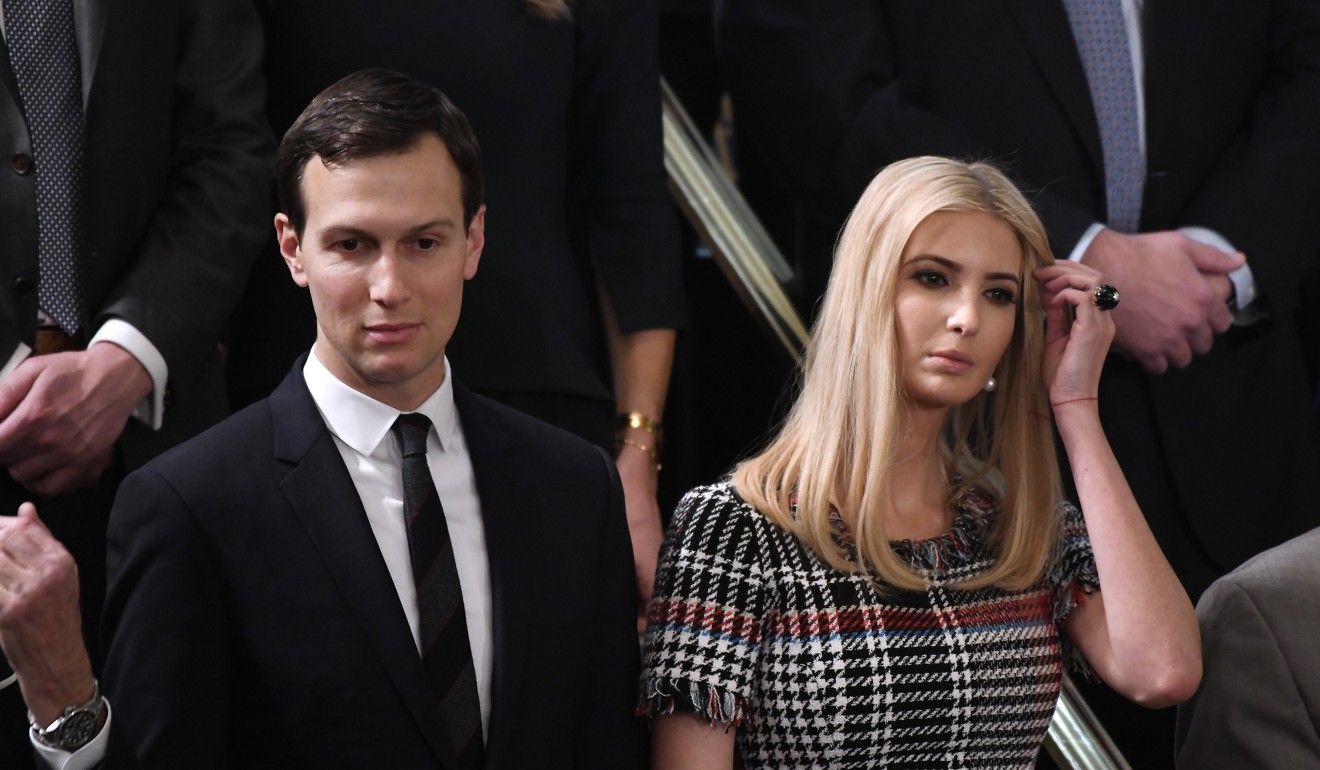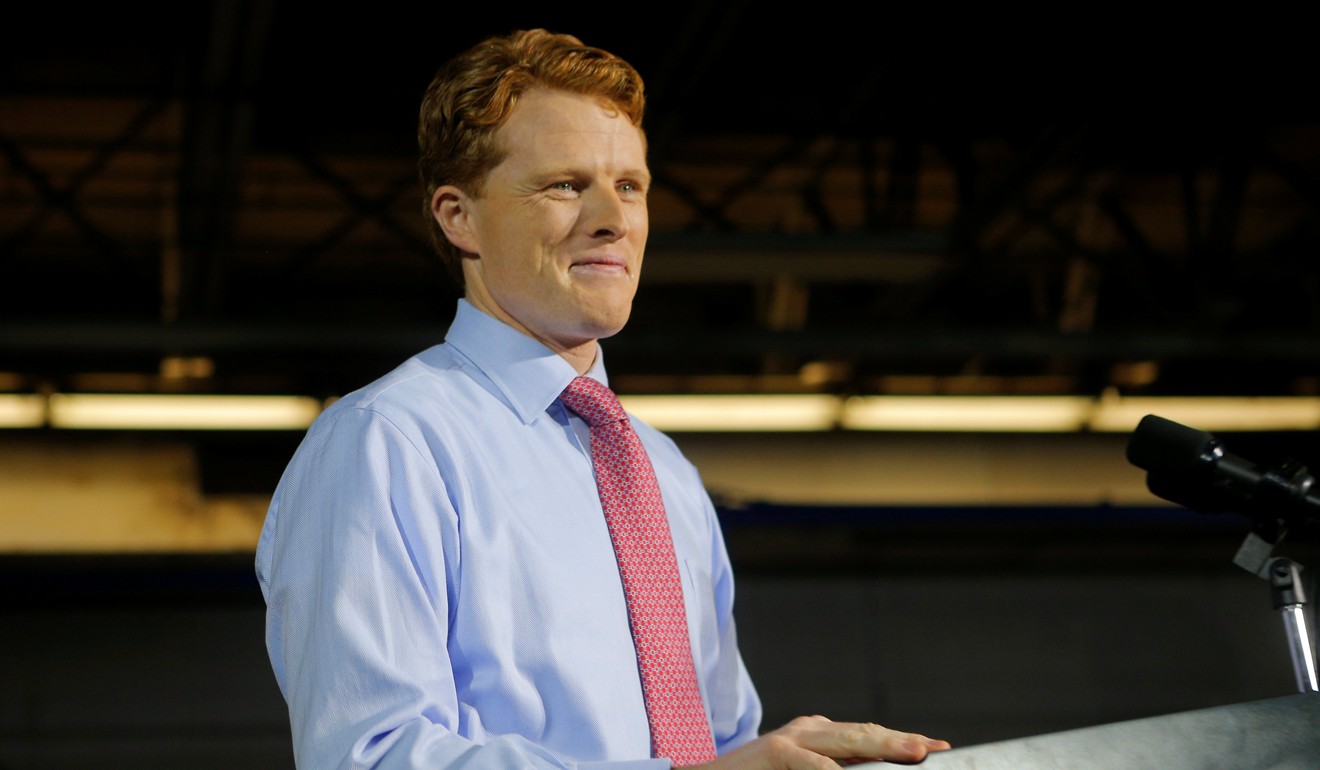
Analysis | ‘Our new American moment’: Trump claims to seek unity and common ground but divisions remain clear
The president moved to set disagreements aside, claiming credit for the booming economy and seeking to lay the groundwork for the kind of bipartisan achievements that have eluded him
“Tonight, I call upon all of us to set aside our differences, to seek out common ground, and to summon the unity we need to deliver for the people,” he said at the top of his roughly hour-long speech. “This is really the key: these are the people we were elected to serve.”
It was a striking difference in tone for a president who came into office decrying “American carnage” at his inaugural, and who has since then spoken and tweeted in harsh terms about his perceived enemies, including lawmakers of both parties and his vanquished opponent, Hillary Clinton.
Watch: Trump delivers his first State of the Union address
I call upon all of us to set aside our differences, to seek out common ground, and to summon the unity we need to deliver for the people
Trump continued to warn against what he sees as the scourge of illegal immigration. But the warnings were cloaked around softer descriptions of the American character, describing the nation as “one team, one people and one American family”.
As he reeled off a string of natural disasters and tragedies, including the shooting at a congressional baseball practice that nearly killed a Republican House leader, he emphasised that “we came together, not as Republicans or Democrats, but as representatives of the people”.
The speech came in what has become a familiar spot for Trump: at a historic low in polls, furious over the Russia investigation and frustrated that he is not getting credit for a good economy and keeping his promise to shake up the government.
But the president put much of that aside, claiming credit for the booming economy as he sought to lay the groundwork for a bipartisan achievement that has eluded him – on immigration, and a major new infrastructure initiative.
Trump, like other presidents facing troubles, is hoping the high-profile, nationally televised speech will help him move past the tumult in his White House and the shadow of the Russia investigation – an inquiry into his campaign’s possible collusion with Russia’s election meddling, and his own alleged acts of obstruction – that has consumed his first year in office.
“This is in fact our new American moment,” Trump said. “There has never been a better time to start living the American dream.”
Trump hammered the theme of “building a safe, strong, proud America”; which fits loosely around policy proposals for a US$1.5 trillion plan to build a “safe, fast, reliable and modern infrastructure our economy needs and our people deserve”; an increase in military spending, and an overhaul of the immigration system. The immigration plan includes a call to sharply cut the number of legal immigrants while allowing a path to citizenship for young “Dreamers” who were brought to the country illegally as children.

Trump framed his desire to restrict immigration as a security issue, arguing that a porous border has increased the threat of terrorism and drug trafficking. Immigrant advocates say Trump is creating scapegoats, and they accuse the president of deepening racial and ethnic divides.
The president, however, contended that he wants to be a uniter.
This is in fact our new American moment. There has never been a better time to start living the American dream
“Tonight I am extending an open hand to work with members of both parties, Democrats and Republicans, to protect our citizens, of every background, colour and creed,” Trump said.
He told a group of network television anchors meeting at the White House earlier on Tuesday that his biggest lesson since taking office more than a year ago has been tempering his profit-centred business instinct with the need to show “heart” in his governing decisions.
“What I’m doing now, a lot of it is heart, a lot of it is compassion, a lot of it is far beyond money – such as immigration,” he said, adding, “If I was doing this purely from an economic standpoint, I would sit down and tell you in one second what I’d be doing, OK?”
Eleven months ago, Trump addressed Congress and a prime-time TV audience from the Capitol, but by tradition a president’s first report on the state of the union – based on a constitutional requirement – does not occur until after a year in office.
Although presidents traditionally use these speeches to lay out their vision early in the year, they also try to claim credit for first-year achievements. Trump spoke about the economy and his US$1.5 trillion tax cut, boasting as he often does about the rising stock market and low unemployment.
Those trends began in President Barack Obama’s first term, after the Great Recession, and the pace of growth actually slowed a bit in the final quarter of 2017. But that has not stopped Trump from arguing the country would have hit the skids if he had not been elected.
Americans are generally pleased with the economy. In a recent Pew poll, 41 per cent of Americans rated it as excellent or good, one of the strongest such ratings in a decade. Yet many Americans do not give Trump credit. On average, polls show his approval at about 40 per cent, lower than the standing of any of his predecessors in the modern era after a year in office.

Democrats have worked aggressively to deny Trump any credit for the economy, arguing that his predecessor is responsible for the trends Trump inherited and that subsequent gains are little different from those in Obama’s final years.
“Two words I don’t think we’ll hear tonight: Thanks, Obama,” Senate Minority Leader Charles E. Schumer, D-N. Y., said before the speech. Schumer sat glum-faced through much of the address.
The recently passed tax cut law has elicited mixed expectations, according to Pew, with about a third of Americans saying they expect it to improve their personal finances, a third saying they expect it to harm them and another third expecting no change.
Two words I don’t think we’ll hear tonight: Thanks, Obama
Other polls have shown a majority of Americans believe the tax cuts favour high-earners, contradicting Trump’s promise to deliver for blue-collar workers and the middle class.
Administration officials say the tax cut will grow more popular as Trump sells it and as the large reduction in corporate rates leads to higher middle-class wages. Economists, including at the Federal Reserve, have more modest expectations, predicting a small short-term effect on economic growth.
In his speech, Trump named the tax cuts, reduced regulations and what he calls an end to the “war on American energy” – including coal – as among his promises fulfilled.
He credited the tax cuts with prompting businesses to give bonuses for roughly 3 million workers, though he exaggerated the amounts as “thousands and thousands of dollars” when most are US$1,000. Some wage hikes and bonuses were negotiated in union contracts or planned by corporations before the tax cuts became law.
Trump also trumpeted success in beating back the militant group Islamic State, while conceding that “there is much more work to be done”.
“Past experience has taught us that complacency and concessions only invite aggression and provocation,” he said. “I will not repeat the mistakes of the past administrations that got us into this dangerous position.”

Trump, like every president since Ronald Reagan, invited guests who reflect aspects of his agenda to sit with the first lady in the House gallery. Among those joining Melania Trump on Tuesday were Americans said to be benefiting from the new tax cuts, parents who lost children to gang violence, a Marine who re-enlisted after losing his eyes and legs, and a man who led a volunteer rescue effort for victims of Hurricane Harvey along the Gulf coast.
Democrats had their own guests, dominated by a number of “Dreamers,” immigrants brought to this country illegally as children. A Republican, Rep. Paul Gosar of Arizona, urged that they be arrested when they tried to enter the Capitol, but leaders of both parties ignored him.
Past experience has taught us that complacency and concessions only invite aggression and provocation
Trump is unlikely to change many minds with a single speech. For all the attention paid to them, these prime-time addresses seldom move public opinion much. And Trump has had a particularly difficult time sticking to a message, often creating new controversies within days of a well-received speech – like the one last February, which he followed with an explosive tweet alleging without evidence that Obama had wiretapped his phones.
Even as Trump speaks, members of Congress are debating the potential impacts of a memo alleging abuses by the Justice Department and FBI. It was created by the staff of Rep. Devin Nunes, the California Republican who leads the House Intelligence Committee.
Some Republicans who have seen the memo say it shows bias in the FBI while Democrats familiar with it argue that the Republicans selectively used information to try to scuttle the Russia investigation. Republicans on Nunes’ committee defied Justice Department objections and voted to release the memo Monday night in a party-line vote; Trump now has up to five days to weigh in, but he is not expected to object to its release.
The issue underscores the increasingly tense and partisan climate now surrounding the investigation, as Trump and his allies have worked to cast doubt on law enforcement’s ability to conduct an unbiased inquiry.
Donald Trump’s key points
Appeal to unity
Trump – one of most divisive and controversial presidents in US history – sought to highlight things that Americans share, and appealed to the power of unity: “All of us, together, as one team, one people, and one American family can do anything.”
Rebuilding infrastructure
Trump said the time has come to “rebuild our crumbling infrastructure,” calling on Congress to draft legislation that “generates at least $1.5 trillion for the new infrastructure investment that our country so desperately needs.”
“We will build gleaming new roads, bridges, highways, railways, and waterways all across our land,” he said.
Booming economy
Taxes have been slashed, “the stock market has smashed one record after another” and companies and jobs are coming back to America, Trump said.
“For many years, companies and jobs were only leaving us. But now they are roaring back, they’re coming back, they wanna be where the action is,” he said.
Immigration
Current immigration policies allow “drugs and gangs” to pour into the country and facilitated recent extremist attacks, Trump said, reiterating his four-pillar plan for immigration reform and calling on Congress to take action.
“It’s time to reform these outdated immigration rules, and finally bring our immigration system into the 21st century,” Trump said.
‘Unmatched power’
China and Russia are economic rivals who challenge US interests and values, and North Korean missiles “could very soon threaten our homeland,” Trump said.
The solution? “Unmatched power,” which he said “is the surest means to our true and great defence.”
Trump also called for Congress to authorise “all necessary power” for the US to detain “terrorists” captured abroad, and for the detention facility at Guantanamo Bay to be kept open.

